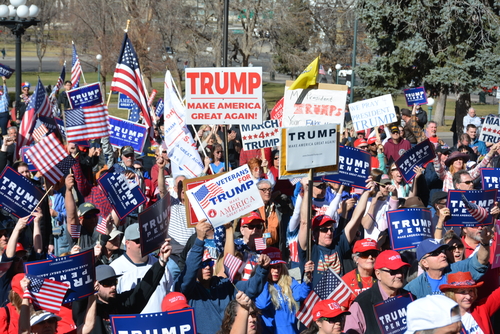
In a move that has sent shockwaves through the political landscape, the Department of Justice (DOJ) has taken an extraordinary step in its investigations surrounding former President Trump. The DOJ, under the direction of special prosecutor Jack Smith, has issued a sweeping demand to a major social media platform for a comprehensive list of users who have interacted with Trump’s account. This includes those who have retweeted, liked, or mentioned the former president’s Twitter handle.
The implications of this action are far-reaching and have raised serious concerns about privacy and the potential for political targeting. The order, which was accompanied by a nondisclosure directive preventing the social media company from informing the affected users, represents an unprecedented intrusion into the digital lives of private citizens.
THEY'RE COMING AFTER YOU: Biden's DOJ Targets Trump Supporters on Twitter – Demands List of All Users Who Retweeted, Liked, or Mentioned President Trump's Twitter Account
It's a total Commie, Fascist, NWO takeover! Hope is NOT a strategy! This situation is not going to correct… pic.twitter.com/TMchuMQzEO
— ⚔️Nevada El Jefe🔥💯TRUMPMAN🔥IFBP (@OldNevadaElJefe) November 29, 2023
Critics argue that this latest development is indicative of a broader pattern of politicization within federal law enforcement agencies. They claim that the DOJ’s actions go beyond legitimate investigative practices and veer into the territory of political persecution. The term “political hitman” has been used to describe the special prosecutor at the helm of this operation, suggesting a vendetta-driven probe rather than an impartial pursuit of justice.
The warrant details are extensive, demanding not only user interaction data but also private direct messages, IP addresses, account settings, and even advertising information related to the former president’s account. This level of detail could reveal a wealth of personal information about individuals, merely based on their online activity related to a political figure.
BE PROUD YOU ARE PART OF HIS TEAM
THEY’RE COMING AFTER YOU:
Biden’s DOJ Targets Trump Supporters on Twitter – Demands List of All Users Who Retweeted, Liked, or Mentioned President Trump’s Twitter Account
https://t.co/7k0GKrdzXG pic.twitter.com/TkZi37Yb19
— TRUTH NOW ⭐️⭐️⭐️🗽 (@sxdoc) November 29, 2023
The social media platform’s resistance to the nondisclosure order, citing First Amendment concerns and the Stored Communications Act, was met with a legal challenge that ultimately failed. This has sparked a debate over the balance between national security interests and the protection of civil liberties.
Supporters of the former president view this as a continuation of what they perceive as a witch hunt against Trump and his allies. They see it as an attempt to intimidate and silence the voices of millions of Americans who supported the former president’s policies and leadership.
The DOJ’s opposition to transparency in this process has been criticized as well. The argument that notifying the former president would cause “statutorily cognizable harm” has been met with skepticism from those who question the true motives behind keeping such actions secret from the public.
This incident has led to a broader discussion about the role of government surveillance in a democratic society. Questions are being raised about the extent to which government agencies should be able to monitor and collect data on individuals’ political affiliations and activities.
As the situation unfolds, it remains to be seen how these actions will impact the relationship between the government and the governed. The chilling effect on free speech and political engagement is a concern for many who fear the consequences of expressing their political views in an increasingly monitored digital environment.
In conclusion, the DOJ’s demand for Twitter data on Trump supporters marks a significant moment in the ongoing tension between government authority and individual privacy rights. It serves as a stark reminder of the delicate balance that must be maintained to preserve the foundational principles of freedom and democracy.










